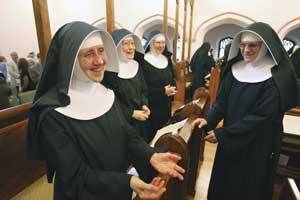The Vatican’s plan to ease the absorption of groups of disaffected Anglicans, published on Nov. 9, three weeks after it was announced in Rome and London, upset many involved in ecumenical dialogue, delighted the traditionalists at whom it was aimed and gave canon lawyers much to mull over. The apostolic constitution Anglicanorum Coetibus (Groups of Anglicans) provides for the creation of a new kind of jurisdiction known as a personal ordinariate. This “separate but overlapping jurisdiction,” as it was described by the archbishop of Westminster, Vincent Nichols, would allow former Anglicans to be full Catholics while preserving many of their liturgical and other traditions.
Anxious to limit the ecumenical fallout, the Congregation for the Doctrine of the Faith stressed that this was not an initiative of the Holy See but a response to many requests over the years from Anglicans who have broken with their church or whose relationship to it has become more and more uncomfortable. By recognizing the “elements of sanctification and of truth” outside the visible confines of the Catholic Church, the constitution explained, it was acknowledging the “forces impelling towards Catholic unity.” Some critics, however, saw the move as giving up on the official Anglican-Roman Catholic dialogue process, known as Arcic, which aims at eventually uniting the Catholic Church and the Anglican Communion.
The two bodies most identified with the petition to Rome praised the constitution as generous and imaginative. Both the Traditional Anglican Communion, which split from Canterbury in 1991, and the Church of England group Forward in Faith—which has about 1,000 Anglo-Catholic priests as members—praised the flexibility and vision of the apostolic constitution. A TAC statement said each local synod would need to respond; its United Kingdom wing was the first to do so, announcing that its 20 parishes would be seeking communion through a personal ordinariate.
Meanwhile the Rev. Geoffrey Kirk, national secretary of Forward in Faith, said he thought Anglicanorum Coetibus proved to be more generous than had been previously suggested. “Of the 450 parishes I knew would take [the pope’s invitation] seriously, I said between 150 and 200 would convert. Now I think it’ll be more than 200,” he said. The group’s chairman, Bishop John Broadhurst, said the Vatican’s new home for Anglo-Catholics was what they had sought in vain from Canterbury. “‘What Rome has done is offer exactly what the Church of England has refused,” he said.
A crucial issue for Anglican priests pondering the move will be whether they can be reordained as Catholic priests while being married. The apostolic constitution makes clear that they can do so on a “case-by-case” basis—as happens already—as long as there are no impediments, such as having formerly been a Catholic priest. But in future, the document implies, this derogation from the norm of clerical celibacy will be more restrictive. This leaves a question mark hanging over the “separate houses of formation” provided for in the plan.
Each ordinariate will be headed by a priest or unmarried bishop. Married bishops will have the status of presbyter but will be granted the privileges of retired Catholic bishops, joining bishops’ conferences as nonvoting members and allowed to wear episcopal insignia. The apostolic constitution also allows for former Anglican clergy members to hold down careers not incompatible with their clerical status, a concession that will encourage non-stipendiary Church of England clergy members and others who are wondering how they will survive.
Inevitably, money and property will play a part in deciding whether Anglicans choose to accept Rome’s offer. The ordinariates will need to be self-funding, and departing congregations may not succeed in persuading their local Church of England bishops to allow them to continue to worship in their buildings. Many details remain to be negotiated—a process that in itself opens up new paths in Anglican-Catholic relations.








